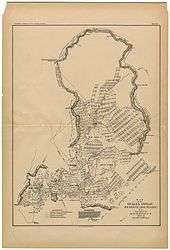Qualla Boundary

The Qualla Boundary or The Qualla is territory held as a land trust for the federally recognized Eastern Band of Cherokee Indians, who reside in western North Carolina. The area is part of the Cherokees' historic territory. As a trust, the land is technically not a "reservation" per se, as the land was not "reserved" by the federal government; it was purchased by the tribe in the 1870s and subsequently placed under federal protection.[1][2] Individuals can buy, own, and sell the land, provided they are enrolled members of the Tribe of the Eastern Band of the Cherokee Indians.
Location

The Qualla Boundary is located at 35°30′N 83°16′W / 35.500°N 83.267°WCoordinates: 35°30′N 83°16′W / 35.500°N 83.267°W.
The main part of the Qualla Boundary lies in eastern Swain and northern Jackson counties (just south of Great Smoky Mountains National Park). A small portion of the main trust lands extends eastward into Haywood County. The trust lands include many smaller non-contiguous sections to the southwest in Marble, Hiawassee and Hanging Dog areas of Cherokee County, North Carolina and the Snowbird community in Graham County, North Carolina. The total land area of these regions is 213.934 km² (82.6 sq mi), with a 2000 census resident population of 8,092 people.
History
.jpg)
The indigenous Cherokee, an Iroquoian people, have occupied the area for centuries, having migrated from the Great Lakes area. The Cherokee have long occupied this area, having migrated here centuries before the Europeans arrived. During their colonial expansion west, European settlers sometimes came into conflict with the Cherokee, who had territory extending into present-day Tennessee, Georgia and Alabama. The Cherokee were forcibly removed from much of this area, especially the Black Belt in Georgia and Alabama, under authority of the 1830 Indian Removal Act, and were relocated to Indian Territory in present-day Oklahoma.
The Qualla Boundary was first surveyed in 1876 by M. S. Temple under the auspices of the United States Land Office. These pieces were embodied in a map published as the "Map of the Qualla Indian reserve".[3]
The Qualla Boundary is a land trust supervised by the United States Bureau of Indian Affairs. The land is a fragment of the extensive historical homeland of the Cherokee in the region. It was considered part of the Cherokee Nation during the nineteenth century prior to certain treaties and Indian Removal in the 1830s. William Thomas, adopted as a boy by the chief Yonaguska, bought much of the land for use by those Cherokee who remained in North Carolina after removal.[2] Although he had assimilated as a Cherokee, he was white and able to buy land, which the Cherokee could not do. The Cherokee organized and formed a corporation in 1870 to be able to purchase and hold additional lands.[1]
A United States Department of Interior sign, entitled "Qualla Indian Reservation", reads:
| “ | The Cherokee domain once extended far beyond the distant mountains, but the white man, with broken treaties and fruitless promises, brought trouble to the Indians and caused their banishment to an Oklahoma reservation. A few escaped capture and fled into the Great Smokies, eventually forming the Eastern Band that now lives on the Qualla Reservation in the valley below. | ” |
Law and government
The tribal community functions like most municipalities, operating schools, law enforcement, and rescues services (police, fire, EMS, and wildlife management), as well as their own hospital and casino. The Tribe has operated a court system since 1987.
Tribal police have exclusive police jurisdiction on Indian lands, though the FBI and other federal agencies also have jurisdiction to handle major federal offenses. NC State Troopers, motor vehicle inspectors, wildlife officers, state alcohol agents, SBI agents, and other state peace officers assigned to counties that overlap with the Qualla Boundary can be called to assist tribal law enforcement officers, and can be commissioned as "special officers" of the Department of Interior to assist in investigations. Non tribal members charged with a crime are referred to local county courts.
Representation in media
In the mid-1950s, much of Disney's five-part television series, Davy Crockett (starring Fess Parker), was filmed here.
See also
References
- 1 2 "History & Culture". Eastern Band of Cherokee. Archived from the original on April 15, 2015. Retrieved April 15, 2015.
- 1 2 Qualla Boundary, NCPedia.org (retrieved 15 April, 2015)
- ↑ Map of the Qualla Indian Reserve (Boundary) N.C. :: North Carolina Maps
Further reading
- Eastern Cherokee Reservation, North Carolina United States Census Bureau
- Indians, Eastern Band of Cherokees of North Carolina, by Thomas Donaldson, 1892, 11th Census of the United States, Robert P. Porter, Superintendent, US Printing Office, Washington, D.C. Published online at Eastern Band of Cherokees of North Carolina. Retrieved on 2009-01-08
External links
| Wikimedia Commons has media related to Qualla Boundary. |